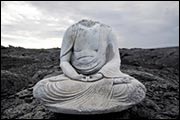Broken Buddha
The enlightened one as imperfect, cracked, and chipped.
I don’t know why it makes me remember a woman—we’ll call her Julie Gates—who was a pillar of my husband’s Presbyterian church. Tall, slender, righteous, well put together in pumps and pearls. Julie was a community saint and icon who had founded “Senior Communications,” connecting the elderly all over town. Whenever her name was mentioned, someone would breathe out reverently: “Oh, she is wonderful,” and everyone around would nod with downcast eyes and soft faces. She and her husband were to leave that church within a year because it “wasn’t Christian enough.”
“How are you enjoying being a mother?” she asked me. We had two small boys, one maybe five years old and one still a toddler. My husband, the minister, was gone a lot, and I was juggling a therapy practice, mothering, and being a writer. “I love it,” I said, “I mean, I’m tired of changing diapers, but the rest is great.” It’s the kind of thing parents say to one another to make the connection of telling the truth about one’s life. Most people would touch your arm with a warm smile full of understanding and your hearts would beat together for a moment leaving both of you strengthened.
She did not touch my arm. She fixed me with an intense gaze and said, “I loved changing diapers. I loved every minute of raising my children. Every. Minute.” My heart sank. I don’t know what her heart was doing. I couldn’t feel her heart anywhere. There is nothing crueler than suggesting to a young mother that she is not a good one. She quietly suspects that’s true every single day of her life. I say “my heart sank,” but that is only half the truth. It sank into a fighting stance with both hands raised.
This particularly crappy combination of sweetness and meanness had been coming at me from church people since I was eight years old. There was a line to toe; there was a circle of approved thoughts and behaviors within which to stay if you were to be a member of the group in good standing. If it looked as though you were about to stray, the enforcers descended with that exact tone. “Oh, you don’t think that,” they would say with a tinkling laugh. A spiritual person was supposed to be “victorious,” triumphant in the conquering of life’s difficulties, praising God in the midst of any circumstance, grateful for whatever came, peaceful in the heart, always. If you didn’t feel it, by god you should just act as if you did, or it would spook all the other horses in the pasture.
The broken Buddha says I don't have to be scared of being the way I am.
I’ve met some non-Evangelicals with that same cruel but somehow comfortable worldview. As a practicing therapist I met a lot of people who trusted in therapy. They would speak as if you could “get help” for any situation and handle it with your head held high, your intellect clear, and your feelings in good order. If you get healthy enough you’re supposed to be able to go through even a nasty divorce with peace in your heart. If something disturbing disturbs you, you should get help.
The broken Buddha tells me that sometimes agony is appropriate.
The part of me I’m least proud of imagines that this Buddha’s hand detached when he reached out to someone who said something on the order of “Everything happens the way it should” and slapped them silly. In a dream workshop I was leading, an older woman was sharing her grief at having lost her son in his 20s to melanoma. They hadn’t seen it because it was under his hair. A woman across the table tilted her head and spoke in that breathy voice that some people feel makes them sound more spiritual. Her eyes were wide too, and she didn’t blink. “Have you ever thought about why he might have wanted to draw that suffering into his life? Why you might have wanted to draw it into yours?”
The broken Buddha tells me that life is not neat.
Life is gorgeous and horrific and beyond understanding. We may create certain situations, draw certain things, but other suffering strikes like a tiger from the tall grass, snatching us from one life into another without cause or warning. I meditate on the broken hand of the Buddha and it comforts me. It tells me that the spiritual moves in and through cracks and gaps, that it is wild and doesn’t make sense. It sits with you even through something that can’t be fixed by intelligence or kindness or love.
Curious about the statue, I learned that his broken hand is in the “Karana Mudra,” the shape used for warding off demons.
“The enlightened one is still whole,” one of the comments under the photo reads. Someone was made nervous by the Buddha’s broken hand. The one who wrote that comment wants it to be true but he doesn’t know. Maybe you can be enlightened and broken too. Sometimes I feel like I understand so much, that I can be a lot of help to people. Other times my mind is blank and there is nothing in my mind or heart to say but “I’m so sorry.” I want to reach out but my hand is lying in my lap, still in a shape of warding off demons of fear and illness, financial terrors and loss, and I can’t do anything with it.
The broken Buddha says he knows how I feel. Our hearts beat together for a time, and we are both strengthened.








